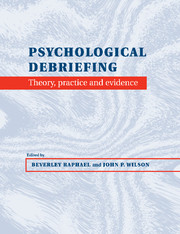Book contents
- Frontmatter
- Contents
- List of contributors
- Introduction and overview: Key issues in the conceptualization of debriefing
- Part I Key conceptual framework of debriefing
- Part II Debriefing: models, research and practice
- 5 Critical Incident Stress Management and Critical Incident Stress debriefings: evolutions, effects and outcomes
- 6 Debriefing with emergency services: Critical Incident Stress Management
- 7 Debriefing and body recovery: war grave soldiers
- 8 Debriefing and body recovery: police in a civilian disaster
- 9 Debriefing after massive road trauma: perceptions and outcomes
- 10 Debriefing and motor vehicle accidents: interventions and outcomes
- 11 Debriefing with service personnel in war and peace roles: experience and outcomes
- 12 Debriefing post disaster: follow-up after a major earthquake
- 13 Debriefing after disaster
- 14 Children and debriefing: theory, interventions and outcomes
- 15 Debriefing adolescents after critical life events
- Part III Adaptations of debriefing models
- Part IV Debriefing overview and future directions
- Conclusion: debriefing – science, belief and wisdom
- Index
12 - Debriefing post disaster: follow-up after a major earthquake
from Part II - Debriefing: models, research and practice
Published online by Cambridge University Press: 06 January 2010
- Frontmatter
- Contents
- List of contributors
- Introduction and overview: Key issues in the conceptualization of debriefing
- Part I Key conceptual framework of debriefing
- Part II Debriefing: models, research and practice
- 5 Critical Incident Stress Management and Critical Incident Stress debriefings: evolutions, effects and outcomes
- 6 Debriefing with emergency services: Critical Incident Stress Management
- 7 Debriefing and body recovery: war grave soldiers
- 8 Debriefing and body recovery: police in a civilian disaster
- 9 Debriefing after massive road trauma: perceptions and outcomes
- 10 Debriefing and motor vehicle accidents: interventions and outcomes
- 11 Debriefing with service personnel in war and peace roles: experience and outcomes
- 12 Debriefing post disaster: follow-up after a major earthquake
- 13 Debriefing after disaster
- 14 Children and debriefing: theory, interventions and outcomes
- 15 Debriefing adolescents after critical life events
- Part III Adaptations of debriefing models
- Part IV Debriefing overview and future directions
- Conclusion: debriefing – science, belief and wisdom
- Index
Summary
EDITORIAL COMMENTS
Kenardy and Carr review experience of debriefing as reported by participants in a community-based study following an earthquake in Newcastle, New South Wales. They also review other work such as that of Mitchell's group, Watt's studies and other research. They note that the perceptions of helpfulness as described in Watt's work are nevertheless frequently uncorrelated with outcome - or, as Ørner has more recently reported, debriefing appears to be perceived as helpful by those who seem to need it least.
The issue of expectancy that debriefing will be beneficial is important, and needs to be addressed in any critical review of debriefing and its potential effectiveness. The authors note that their study was not originally designed as an empirical test of debriefing, but rather was a naturalistic opportunity to incorporate systematic questions into their investigation of the consequences of the earthquake and to explore specifically issues for professional and volunteer disaster workers. Their study evaluated and compared individuals (helpers) who reported having been debriefed with those helpers who did not experience debriefing but were equivalent in terms of personal threat experience and levels of stress in ‘helping’ roles, as well as working in dangerous settings. The debriefed group was composed of more ‘counsellors’ and more women. Their findings report that 80% found debriefing helpful, but outcomes (measured by the Impact of Event Scale and the General Health Questionnaires) were no different, nor was rate of recovery.
Keywords
- Type
- Chapter
- Information
- Psychological DebriefingTheory, Practice and Evidence, pp. 174 - 181Publisher: Cambridge University PressPrint publication year: 2000
- 5
- Cited by

